At South by South West in Austin Texas, every year one of the biggest ticket items is being in the room as Amy Webb reveals the Future Today Institute’s Tech Trends Report, a deep dive into all the tech trends you’ll need to follow in the year ahead.
If you haven’t been to SXSW during one of Webb’s Tech Trend Report talks, then it is hard to describe. With a line that spanned two floors (and a fire escape), and people lining up more than three and a half hours in advance, it was almost Rolling Stonesesque.
The talk itself was a data-driven analysis of the emerging tech trends that need to be on people’s radars in 2023. Webb also showed those in attendance scenarios that changed their perspective on the future.
Mediaweek’s Greg “Sparrow” Graham gave his own key takeaways from the talk which can be seen below:
Sparrow’s Amy Webb top takeaways:
• Focus to see the signals
• Use ADM to prioritise
• The internet as we knew it is over. AISMOSIS is next (when AI systems start interacting with data)
• Everything is readable information
• Era of Assistive Computing
• New tools aren’t available to everyone, which creates a new digital divide
• Everyone will need upskilling
• Big Tech are becoming bigger and more powerful
Mediaweek spoke with Webb, the CEO of the Future Today Institute and professor at NYU Stern School of Business, about the main takeaways from the report and more specifically about what it means for the media and entertainment industry.
“People are just very curious,” said Webb when asked what feedback she has received on her Tech Trends Report so far. “To me, curiosity is so much better than complacency. We are really on the brink of some catastrophically horrible decisions that are being made around the world about various things.
“It’s very helpful that I see people, especially here, being so curious and wanting to take a very deep dive into the report, because the trends are not the end. The trends are the beginning. It sets the groundwork for you to start asking what if. That is the whole point. I think the fact that people are really leaning into asking what if, and they’re using the report to help them do that, whether they’re CEOs or community members.”
In the 800-page report, Webb described the world as if “we’ve been living through the aftermath of cataclysmic explosions”, using examples such as the release of generative AI like ChatGPT, a fusion breakthrough that could someday generate zero-carbon energy, Russia’s ongoing invasion into Ukraine, deep uncertainty about a global recession, and AlphaFold’s protein-folding algorithms that predicted structures for nearly all catalogued proteins known to science.
Webb argued that these and other forces of change “are colliding, going supernovae, and resulting in an unfathomable amount of new signals—bits of change that, over time, result in the trends that shape society,” and this underlined the importance to track new trends as they emerge.
The theme of the 2023 Tech Trends report focused on new signals forming. Webb said this assists leaders who focus on the trends that matter and adapt to changing circumstances to make better decisions and see improved outcomes. Webb said that trends enable people to anticipate near-term change, understand the factors influencing their industries, and develop a point of view on the future.
“There’s this Venn diagram where technology media and business models overlap,” said Webb. “I think that Venn diagram is changing a lot right now.
“Generative AI is starting to change how people get information. I think search is going away – not tomorrow, but certainly over the next decade. To be replaced by a much more aggressive curation, which means subscription models are vulnerable. SEO becomes obviously something different. And in order for it to work it means people have to really be comfortable giving up their personal data.”
But ultimately, Webb said that the most important trends aren’t the sexy attention bragging ones, but the boring ones such as cloud software.
“The stuff that matters right now is largely invisible and kind of boring. And that’s infrastructure. I spend a lot of time talking about the cloud, I know it’s not the sexiest topic, but I could have spent a day just on hyper scalers and how the cloud is changing. A lot of the AI systems that everybody’s excited about, they can’t run locally so you’re accessing them in the cloud, which means that the very nature of the cloud as cloud services evolve is going to be to some degree dictated by the AI companies. Everybody thinks they are the future and that’s a huge gamble that’s being made right now.”

Amy Webb encouraging visitors to head to SXSW Sydney
When asked if anything in this report has surprised her, she said it’s her job to not be surprised, but one thing has happened faster than she predicted.
“Most of the trends are longitudinal, so they evolve but it’s not like there’s a brand new 600 trends every year. The only thing that was truly surprising is how quickly all of the crypto stuff fell. Last year at this time, it’s hard to believe now, but all anybody was talking about was that crypto and NFTs are the future and of course, I said NFTs are not the future. I’m always about the infrastructure because that’s the stuff that matters, NFTs are just the shiny thing right now. I knew at some point it was going to crash out but it happened way faster than even I thought.”
Webb also pointed out the lack of social media presence at SXSW and commented that she noticed a lack of social media engagement as opposed to previous years.
“Of all the years that I’ve been coming, this is the first year that the hashtag SXSW is not trending. It has nothing to do with South By, pre-Covid 200,000 people used to show up at this. This to me feels like it’s about 80% back and I bet you next year it’s going to be back to the crazy insanity that this place always has been, which is fun. I think the fact that I’m not seeing South By trending on Instagram or Twitter is pretty notable. Plenty of people are here and everybody’s having a great time, but I don’t think people are posting so much about it publicly. Or maybe they’re only posting on TikTok.”
How this impacts news and information companies
A key area discussed by Webb in her SXSW featured session and in her Tech Trend Report was generative AI, which she said is something to be thinking of moving forward. Her report pointed to generative applications of such as OpenAI’s DALL-E 2 image generator and how this new tool is rewriting workflows and creating new ways of consuming media.
“ChatGPT is the thing people are talking about right now. It is moving from search to much more aggressive curation, which is one of the things that I highlighted. On the one hand, that’s good for consumers but on the other hand, that really destroys a lot of the current value proposition for media organisations and entertainment companies. I feel like that’s something to really be thinking about going forward.”
Another technology highlighted in the report was how large language and transformer models are revolutionizing how search engines answer questions. The report said that this will radically alter the way consumers discover new content and in turn the way that publishers build relationships with their audiences.
When it comes to the newsroom, Webb anticipated that it may be the entry-level jobs whose value is reassessed amongst generative AI.
“Think of the old general assignment reporters. This kid who would have just graduated from college or whatever, they’re going to go out and pump out 600 words that somebody else is going to rewrite anyways. It feels like chat GPT or Jasper AI is that general assignment reporter.”
The report also talked about how trust in news is at a historic low around the world, which leaves news organizations vulnerable to reputational damage from reasons such as human error or from a coordinated assault by bad actors. And how journalists increasingly need technical knowledge to trace stories, protect themselves from cyberattacks, and monetize their work. The report says that these skills can be filled by training, external partnerships, or breaking down silos in legacy organizations and that innovations of emerging technology generate excitement and enthusiasm from funders, but legacy media companies remain sceptical of changing operations.
Furthermore, the report claims that AI researchers are actively investigating how algorithms can be used to improve news recommendations, detect fake or misleading media pieces, and identify facts in disparate sources. However, it also claims that without the engagement of journalists and media organizations, this risks this work solving the wrong problems or creating deeper issues for the future of news.
When asked about some people’s reluctance of AI, and the timeline that it may be more broadly adopted, Webb pointed out that people tend to feel differently about words than ones and zeros.
“I think that maybe the challenge as humans is that communication, language, and writing feel very connected and numbers do not. Math is another language in a way. I feel like we feel okay, using a tool for math and we don’t feel okay using a tool for language. But it has to do with expression, human expression.”

The entertainment sector
In the entertainment sector, the report states that power is shifting from content platforms to influencers as the latter’s options for sharing content increase and new opportunities to create revenue streams expand. It also states that accessing a global talent pool will become easier with a range of new tools expanding collaboration for hybrid teams.
Additionally, with the introduction of haptic devices, storytelling will engage all of the senses and also venture into personalization. The report states that instead of creating a finite, linear product, different story modules will be combined in different ways and that crowdsourced content, where viewers collectively decide what happens next, is gaining more traction.
The report also predicted that digital twins of celebrities will start to expand the earning potential of their real-life counterparts as AI is moving from supporting to leading the creative process—writing scripts, creating music, and directing. The report claims that as dubbing becomes more automated, AI will translate voice text and adjust the lip movements of actors to fit different languages. One-stop-shop video creation software is also scaling the production of marketing materials and might soon make its way into narrative storytelling.
“I had a long talk with somebody in the creative space, about synthetic media and creating synthetic actors. Doesn’t that make everything easier? The answer is, I don’t know that people are going to prefer synthetic characters, I think we still want that authenticity. What’s the human going to do next?
“Open AI is probably going to release in the next couple of months its video version of ChatGPT. It didn’t invent this, there’s work that’s been done at MIT, at CSAIL, that work has been ongoing for more than a decade. So it’s not like Open AI invented a lot of this, but they may be the first to market with it. China four or five years ago had synthetic media anchors as well, even if they looked a little janky.
“I did not show this during my session but to make a point about consolidation in tech, I made a kind of deep fake of Jeff Bezos, Elon Musk, and Mark Zuckerberg. I combined all of them into one image that looked shockingly like a real person. I made it photorealistic so it looked real and it also looked like all three of them. It would not have been hard for me to turn that image into a talking video. And I could have made a whole parody about how consolidation is bad.”
You can access the full Tech Trend Report here and read Mediaweek’s full SXSW coverage here.
